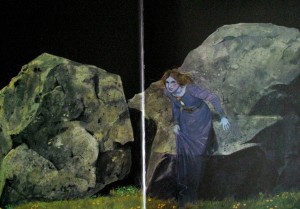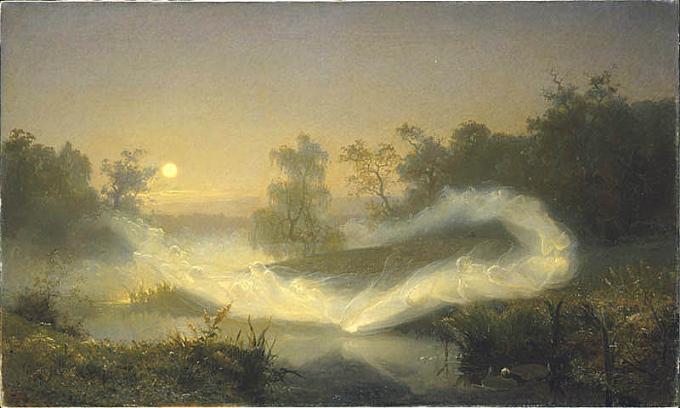Beautiful and dangerous. Posted by hulda on Jun 5, 2012 in Icelandic culture, Icelandic customs, Icelandic history
Elves in the Icelandic lore are quite different creatures from what people have come to think of after reading Tolkien. Depending on the tale they can be either a little too interested in humans, kidnapping people or trying to lure them to live in their homes, which are built in rocks and cliffs, or even outright murderous, killing humans out of dislike or even a bit of fun. It’s therefore no surprise that Icelanders wish to stay in friendly relations with them – no one would ever want one of them as their enemy, that’s for sure*.
One of the most known legends that every Icelander knows is called Ólafur liljurós, or Olaf lily-rose. A very famous song about him still lives on and in case of interest, you can hear it over here. The lyrics differ slightly from the original poem but for most part the story is the same.
Ólafur reið með björgum fram
villir hann, stillir hann,
hitti fyrir sér álfa rann
hvar rauður loginn brann,
bliðan lagði byrinn undan björgunum fram.
Þar kom út ein álfamær,
hún var ekki guði kær.
The story begins at Ólafur riding his horse along a cliff until he comes across an elven home “where fire burned red”. A elf maiden comes out and at this point we find out that she’s not a Christian, a detail that’s often stressed in the Icelandic tales of elves used as a definition between malicious elves and somewhat friendly ones. This is not to be trusted too much, however, since even friendly elves can cause great damage to people if they so wish to.
The poem repeats the second, fourth and fifth line at every stanza so I’m leaving them out.
Hún: “Velkominn, Ólafur liljurós,
gáttu í björg og bú með oss.”
Hann: “Ekki vil ég með álfum búa,
heldur vil ég á herrann trúa.”
Hún: “Þó þú gjörir með álfum búa,
samt mátt þú á herrann trúa.”
Like elves are known to do, she then suggests Ólafur move in with the elves, likely by marriage to her. Ólafur declines. He knows her to be a Pagan and Ólafur himself would rather stay Christian. The elf lady assures him he would not have to give up his faith for living with but alas, Ólafur has already made a big mistake. Elves are easily angered if they feel wronged somehow, and it’s possible Ólafur’s attitude towards the elf lady’s religion was worse for her than he assumed. She asks for a kiss goodbye.
Ólafur laut um söðulboga,
og kyssti frú með hálfum huga.
Saxinu hún stakk í síðu,
Ólafi nokkud svíður.
 But when Ólafur carelessly bends over his saddle to give her a kiss, she stabs him in the side. The poem goes on to describe that he flees and somehow still manages to reach his home, but he’s been wounded too badly and dies soon after.
But when Ólafur carelessly bends over his saddle to give her a kiss, she stabs him in the side. The poem goes on to describe that he flees and somehow still manages to reach his home, but he’s been wounded too badly and dies soon after.
The story of Ólafur exists in other Nordic countries as well and there is often some variation to the theme. For example, in the Faroese version of the song – here played by the awesome Tyr – Ólafur (now called riddararós, knight-rose) gets poisoned instead, and the reason for the elf maiden’s wrath is that he’s leaving her to get married to a human woman the next day. Similarities between these two stories include also riding along the cliff and bending down from the saddle to kiss the elf lover goodbye. What’s different is that in this story he can very much expect the outcome, having been warned by his mother who sees death approach her son.
Interestingly enough, Icelandic tales of this sort put a lot of blame on the victim. Crossing elves is considered something one can do at one’s own risk but whatever happens afterwards is deserved. It’s rare that humans mount any kind of a revenge attack on elves, rather they steer clear of the hapless one who went and messed with folk they should never have messed with because elves get extremely generous when they’re dealing out revenge. Therefore humans only act out if it’s actually elves attacking them for no reason, which also happens in the fairytales to a frightening amount. Still, humans always try to flee first. It’s only after the attacks continue that they try to turn the tables at the elves and even then the outcome is rarely good.
*An interesting survey done in Iceland shows that many people who state that they don’t believe in elves still avoid getting on their bad side. Just in case.

Build vocabulary, practice pronunciation, and more with Transparent Language Online. Available anytime, anywhere, on any device.
About the Author: hulda
Hi, I'm Hulda, originally Finnish but now living in the suburbs of Reykjavík. I'm here to help you in any way I can if you're considering learning Icelandic. Nice to meet you!




